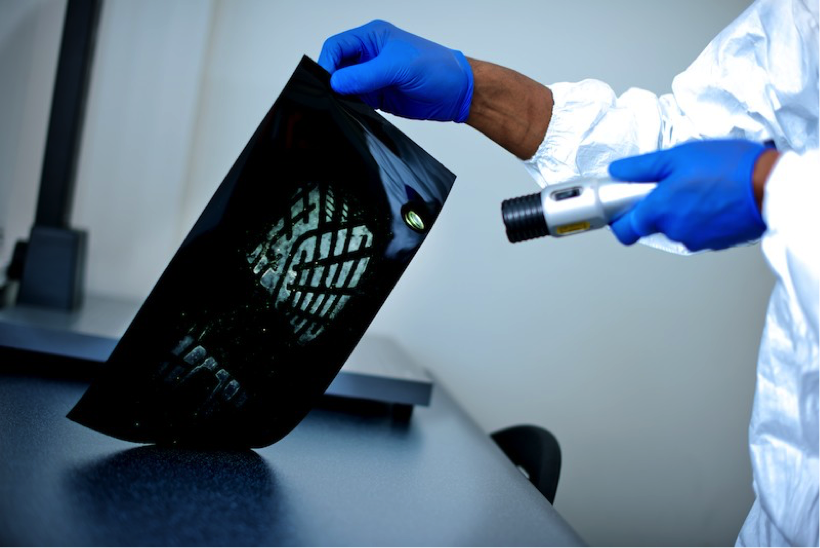|
By Lakshini Mendis
Forensic scientist? Be honest you’re already thinking about CSI, Law and Order or Bones! These shows have been great in showcasing the world of forensics, but let’s take a closer (and more realistic look) at what being a forensic scientist really means. Forensic scientists give an unbiased view of scientific results and help lawyers, juries and judges to interpret these results. So they do play a role in criminal matters, but they are also involved in civil cases, such as a lawsuit from a vehicle or medical problems.
According to the Bureau of Labor Statistics, the median annual wage for a forensic science technician was $47,680 in 2007. However, the earnings of forensic specialists depended on the field in which they were employed. There are a number of fields in forensic science in which you can specialize. Some of these include: Digital and Multimedia Sciences, Psychiatry and Behavioral Science, Pathology, and Toxicology.
To work as a forensic specialist in the US you need at least a bachelor’s degree, and sometimes an advanced degree. Generally, those who provide expert analysis and testimony often have a PhD or Master’s degree in their field of expertise. You can find a list of accredited programs within the USA here, and a list of international programs here. If you are a high-school student you can also check out a CSI summer camp! But to get a better picture of what working as a forensic scientist if really like, I chatted with Antoinette Thwaites and Ja’Neisha Hutley, who are based in Philadelphia, PA. Antoinette uses chemistry to analyze drug evidence for the City of Philadelphia. She also founded the Association of Women in Forensic Science, Inc. Ja’Neisha Hutley works as a forensic serologist and maintains an excellent blog called Forensic Rose. Here are their answers: What attracted you to this profession? Antoinette: Well, initially my interest was in Pharmacy/Pharmacology and I stumbled upon forensic drug analysis while interviewing for another Chemistry job for the City of Philadelphia. I didn't even know such a career existed! When I learned that I was going to analyze controlled and non-controlled substances, I felt very lucky to be hired because I found a job that I could use chemistry to analyze substances. That happened fourteen years ago and I been working as a forensic scientist ever since. Ja’Neisha: When I was younger, my grandmother told me the story of her sister’s gruesome murder. I couldn’t stop asking questions. How was she murdered? Why was she murdered? Who did it? The case was never solved, but that mystery was the driving force behind my professional interest in investigative work, homicide cases, and the study and application of forensic science What do you think are some of the characteristics a forensic scientist should have? Antoinette: I believe a forensic scientist should be detail oriented, a critical thinker, and a problem solver. You must have good verbal and written communication. There are so many skills that you develop that will help you in your personal and professional life. Ja’Neisha: The most valuable characteristic a forensic scientist should possess is the ability to remain impartial and objective when faced with the most heinous of crimes. Regardless of the circumstances of a case, we must always remain neutral. What is your typical day like? Antoinette: A typical day right now is assisting the quality assurance manager with monitoring the quality assurance program for various forensic disciplines in the crime lab. For the past 13 years, I also conducted forensic drug analysis for the Chemistry Unit. Ja’Neisha: There is no such thing as a typical day in this field! What is the best thing about being a forensic scientist? Antoinette: The best thing about my job is being acknowledged because of the significance it has for the criminal justice system. People also are fascinated by what I do because of television. Ja’Neisha: The best thing about being a forensic scientist is having the ability to work with different types of cases. Every case is a challenge and I get to use my expertise to help solve a criminal mystery. What training did you have to undergo to become a forensic scientist? Antoinette: I received a B.S degree in Chemistry from Temple University located in Philadelphia, PA. In addition to that, I received on the job training for at least a year, with numerous external training sessions from law enforcement agencies, forensic science training and seminars relative to forensic drug analysis. Things have changed a bit since 2000 though, so now you need on the job training for at least two years. I qualified for a forensic scientist position in the Chemistry Unit (forensic drug analysis) because of my degree in Chemistry. I'm hoping to return back to school one day to earn an M.S in Forensic Science. Ja’Neisha: I obtained my B.S in Biology with major coursework in biochemistry, genetics, statistics and molecular biology. I also possess an M.S in Forensic Medicine. In addition, I completed an internship with the crime scene unit and the forensic biology lab. Have you faced any challenges (either in your training or career as a forensic scientist)? How did you overcome them? Antoinette: You have to learn to get over rejection. I believe that a lot of individuals expect to get what they want all the time, but it is important to learn that this is not always going to be the case. I learned that it is not how you fall, but how you get up, which matters in the end. Ja’Neisha: I didn't have a mentor. So I was unaware of the required coursework necessary to get into this field. As a result, I had to go back to school and complete those courses. Do you have any advice for someone considering a career as a forensic scientist? Antoinette: My advice to anyone considering forensics as a career is to research what specialty you're interested in. Next, consider getting a mentor from your field of interest, so he/she can coach you. Internships and volunteering are also helpful! Ja’Neisha: If you are interested in working as a forensic scientist in a biology lab, ensure that you have a degree in a natural science. In addition, make sure that you have coursework in genetics, molecular biology, statistics and biochemistry. These classes are required by the FBI to work in any accredited forensic biology laboratory. My last word of advice is to remember that "it ain't like TV!" Want to find out more? · American Academy of Forensic Sciences: Good source of information for students considering a career in forensic science · Association of Women in Forensic Science: Founded Antoinette Thwaites, this is an excellent resource about forensic science. You can find information about events, programs and workshops here too! · Forensic Rose: Ja’Neisha Hutley’s blog about life as a forensic scientist About the Author |
CONNECT WITH USSUBSCRIBE |
The Scientista Foundation, Inc. All Rights Reserved © 2011-2021 | Based in NY | [email protected]
The Network for Pre-Professional Women in Science and Engineering
The Scientista Foundation is a registered 501(c)(3) -- Donate!
The Network for Pre-Professional Women in Science and Engineering
The Scientista Foundation is a registered 501(c)(3) -- Donate!




 RSS Feed
RSS Feed